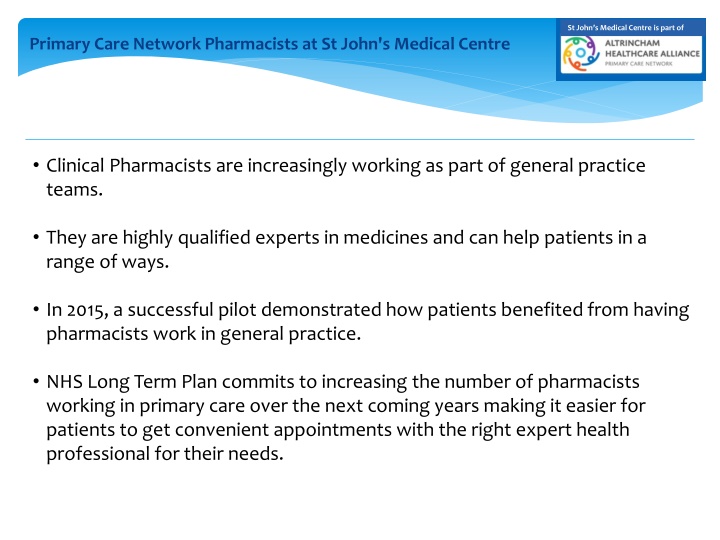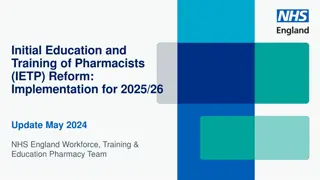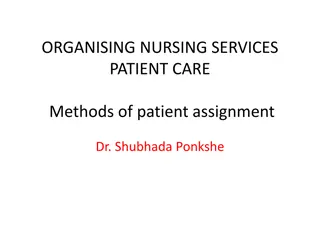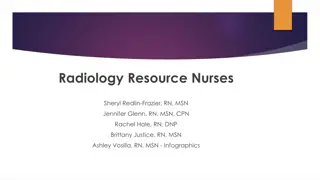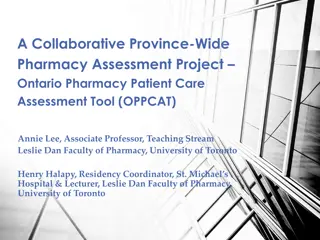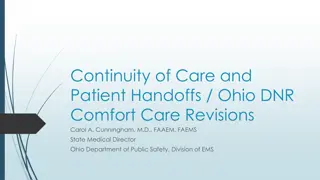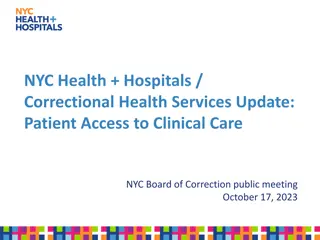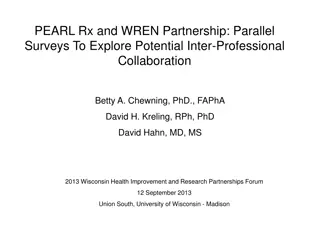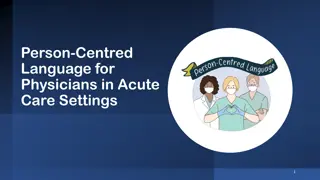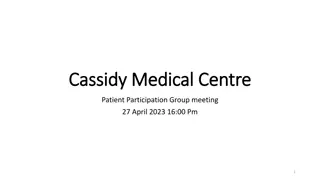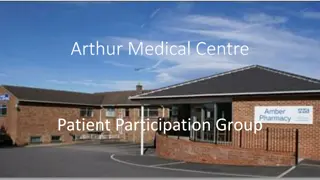Enhancing Patient Care Through Clinical Pharmacists at St. John's Medical Centre
St. John's Medical Centre, a part of the Primary Care Network, integrates clinical pharmacists into general practice teams to provide expert medication management and support for patients. The NHS Long Term Plan aims to expand pharmacist roles in primary care, optimizing patient access to specialized care and improving health outcomes through structured medication reviews, chronic disease management, and positive interventions.
Download Presentation

Please find below an Image/Link to download the presentation.
The content on the website is provided AS IS for your information and personal use only. It may not be sold, licensed, or shared on other websites without obtaining consent from the author.If you encounter any issues during the download, it is possible that the publisher has removed the file from their server.
You are allowed to download the files provided on this website for personal or commercial use, subject to the condition that they are used lawfully. All files are the property of their respective owners.
The content on the website is provided AS IS for your information and personal use only. It may not be sold, licensed, or shared on other websites without obtaining consent from the author.
E N D
Presentation Transcript
St Johns Medical Centre is part of Primary Care Network Pharmacists at St John's Medical Centre Clinical Pharmacists are increasingly working as part of general practice teams. They are highly qualified experts in medicines and can help patients in a range of ways. In 2015, a successful pilot demonstrated how patients benefited from having pharmacists work in general practice. NHS Long Term Plan commits to increasing the number of pharmacists working in primary care over the next coming years making it easier for patients to get convenient appointments with the right expert health professional for their needs.
St Johns Medical Centre is part of Primary Care Network Pharmacists at St John's Medical Centre Core Roles Day to Day Tasks Deal with medication queries i.e alternatives to out of stock medicines Ask my GP queries i.e a patient with a drug side effect Minor ailments advice i.e headlice, conjunctivitis direct patients to appropriate care whether it is the community pharmacists or the need for an urgent/routine GP appointment Medicines Reconciliation - Review handover documentation (from hospital/private clinics) to ensure any medication changes or requested follow- ups (e.g blood monitoring) are promptly actioned - Access hospital medicines information teams for information relating to recent admission to ensure any risks associated with handover from acute to primary care are managed Medication Reviews -Target patient population E.g. polypharmacy patients, patients on high risk drug combinations, Long Term Conditions (i.e HPTN, diabetes, asthma) & vulnerable patients. -Care Home visits 1-2x a week Face to face, telephone or without the patient when appropriate
St Johns Medical Centre is part of Primary Care Network Pharmacists at St John's Medical Centre The DES specification has highlighted key areas for the Primary Care Pharmacists to focus on, many of which are part of the core roles already undertaken. As part of the five-year GP contract Framework reform, the Direct Enhanced Service (DES) was introduced in 2019 Structured Medication Reviews (SMRs) - Comprehensive & clinical review of a patient's medicines and detailed aspects of their health - Holistic & shared decision making - Longer than a general medication review - Targeted key disease areas i.e patients on anticoagulants, frail patients, those on multiple medication CHRONIC KIDNEY DISEASE (CKD) and HYPERTENSION - Early identification and prevention of progression - Optimising BP control, safe drug prescribing COPD - DIABETES - Early identification of pre-diabetes - Referral to weight loss programme in Trafford - Initiation of medication - Regular monitoring and follow ups Medication reviews to support introduction of new GMMMG pathways Appropriate use of ICS, rescue packs Inhaler Technique Non-drug interventions (i.e pulmonary rehab referrals) - - -
St Johns Medical Centre is part of St John s Medical Centre is part of Primary Care Network Pharmacists at St John's Medical Centre Positive Patient Interventions Elderly gentleman who was on a high dose of opioid pain killers was slowly titrated down to a safer level. Found that he had actually started sleeping better and leaving his house more to see friends Melanoma spotted during a general face to face medication review. Patient was directed to GP who referred to dermatologist who confirmed diagnosis and started treatment Patient weighed in clinic. Due to weight loss, blood thinner medication was reduced as a result to prevent potential kidney damage as per national guidelines Patient discharged from hospital and started on a blood thinner medication following a blood clot in his leg (DVT). Was not told how long to take the medication for and this was not evident on the discharge. Pharmacist liaised with discharging Doctor at the hospital to find out. Patient mentioned that she was feeling increasingly tired. Pharmacist requested for her thyroid bloods to be checked. These were then found to be out of national range. GP initiated treatment. Elderly lady was switched to an inhaler she was able to use better. After a month of using she had felt a lot better & able to walk longer distances. Used to be reluctant to leave the house.
